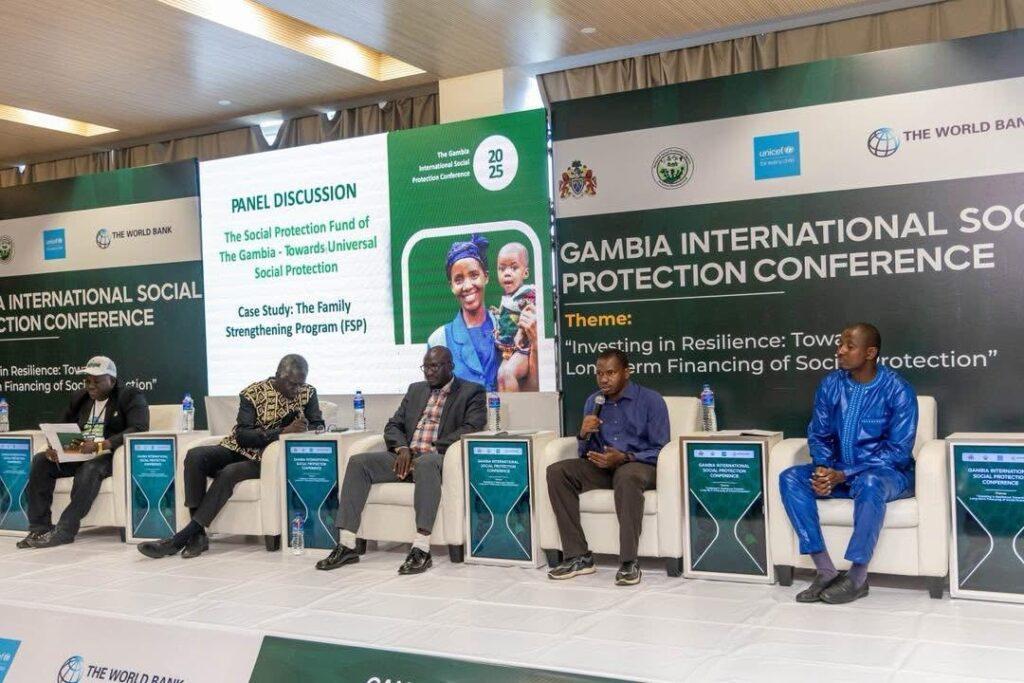Africa-Press – Gambia. The Gambia Social Protection Agency (NSPA) has concluded its three-day international conference on social protection at the Sir Dawda Kairaba Jawara International Conference Center, culminating in a set of key recommendations for the government.
Hannah L.M. Njie, Environmental and Social Safeguard Specialist at NSPA, formally presented the recommendations to the government. They were handed over to Sering Modou Njie, Minister of Foreign Affairs, who represented the Vice President.
The recommendations call on the government to:
Government to ensure consolidation of the 2015 to 2025 policy and renewed commitment towards achieving the 2026 to 2036 National Social Protection policy.
To align the national social protection policy and programs with subregional, regional, and global agendas while diversifying social protection programs to reduce vulnerability.
To adopt sustainable financing strategies, including expanding fiscal space by advocating for international debt relief to free up resources for social protection.
Shifting budget allocation from less productive expenditure to social protection.
Reforming tax systems, public-private building on existing global financing mechanisms, including development cooperation, to increase annual social protection spending. This should include increased budgetary allocations to the social protection fund and the disability fund.
To design an adaptive social protection system for human development.
Maximizing existing opportunities while addressing critical challenges to achieve universal access. This should include institutionalizing adaptive and disaster-responsive social protection mechanisms by 2026.
Integrate disaster risk financing instruments within the national social protection system to enable rapid scale-up of assistance during shocks such as floods, droughts, and food crises. This includes establishing a national contingency financing mechanism and linking early warning systems with social protection delivery systems.
To scale up diversified, inclusive, and shock-resilient social assistance coverage, including cash transfers, disability grants, child benefits, etc., for the policy priority groups with a particular focus on gender, children, and persons with disability using evidence from the Gambia social registry.
To update and maintain the functionality of the Gambia social registry data set for targeting and planning by 2026.
Delivering a statement on behalf of the Vice President, Minister Sering Modou Njie emphasized that social protection is not a luxury but a foundation of dignity and opportunity. He noted that when adequately designed, universal, and well-governed, social protection systems can lift vulnerable groups out of poverty, support families during illness and disasters, and empower workers, particularly those in informal or precarious settings, to participate confidently in the economy.
“Today we have renewed our collective commitment to consolidate the gains of the national social protection policy and to align the forthcoming policy with sub-regional and international frameworks,” Minister Njie said.
He stressed the importance of adopting sustainable financing strategies in line with the Addis Ababa Declaration on Financing for Development and assured that the government would work with all stakeholders to create fiscal space through increased revenue mobilization and prudent expenditure management. This approach will ensure that social spending is prioritized and protected.
Minister Njie added that social protection expenditures across all sectors will be strengthened, with a gradual increase in pooled funding to meet rising demand, including enhanced support for persons with disabilities and closer coordination with the Disability Fund.
Minister Njie underscored the need for a financing model that reflects shared responsibility, effectively leveraging both public and private resources. He stressed the importance of strengthening governance, accountability, and monitoring systems to ensure that every Dalasi spent yields measurable and meaningful improvements in people’s lives.
“Our discussions today must translate into decisive actions, and may our social protection and policies and programs be guided by compassion and grounded in evidence,” he stated.
“Let us view social protection not merely as a policy instrument but as a pledge to uphold the fundamental worth of every human being.”
Concluding his remarks, the minister reaffirmed The Gambia’s commitment to collaborating with all stakeholders to ensure the implementation of the recommendations arising from this call to action.
Momodou K. Dibba, Executive Director of NSPA, expressed gratitude to the agency’s development partners and civil society organizations for their unwavering support throughout the conference.
He noted, “conference proceedings reflect the diverse views that were expressed during the conference. The importance of social protection is in its diverse nature.”
Concluding, Dibba emphasized that it is now time to move from discussion to action, affirming that the agency is prepared to implement the recommendations over the next two years.
For More News And Analysis About Gambia Follow Africa-Press






